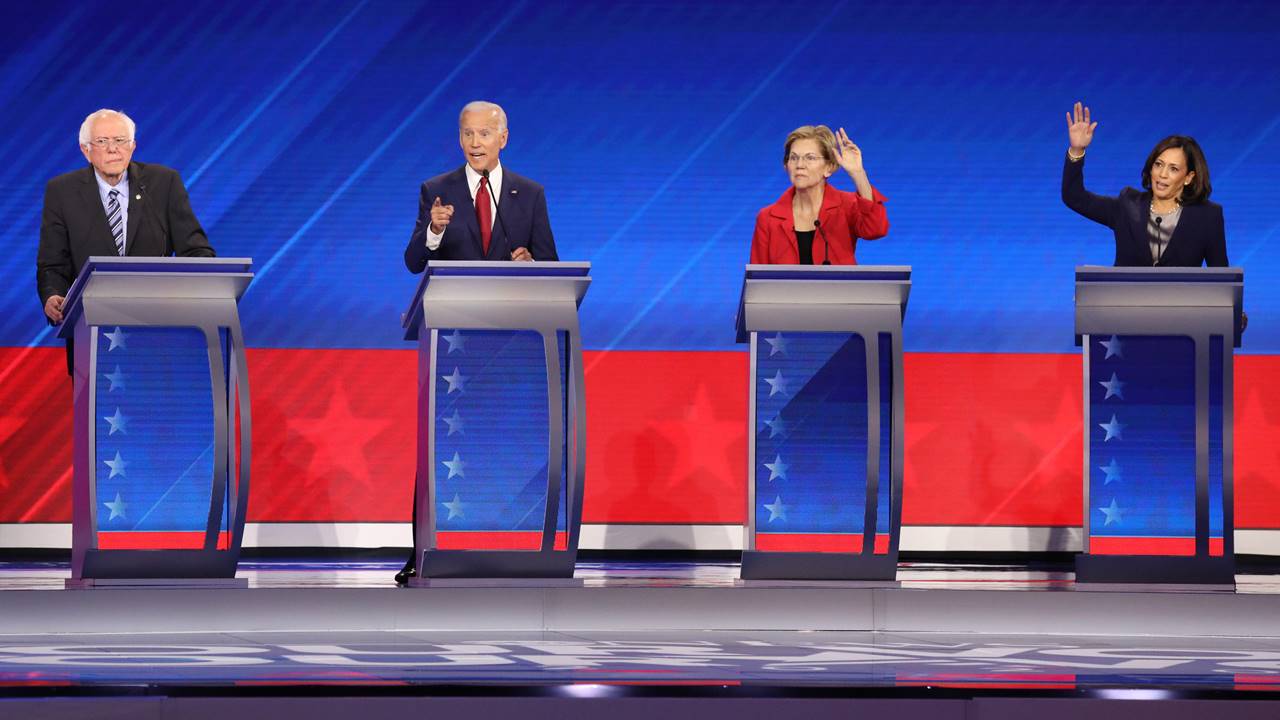Also this week, Kamala Harris releases a long-awaited plan, Elizabeth Warren wants to expand Social Security, and President Trump has a new Republican challenger
A three-hour tour
Former Vice President Joseph R. Biden Jr. walked into the debate at No. 1 in the polls — and squared off against Nos. 2 through 10 for the first time. To protect himself from incoming attacks, he brought a trusty shield: the legacy of former President Barack Obama.

As our colleagues Jonathan Martin and Alexander Burns wrote in our debate overview, Mr. Biden “clung tightly to the legacy of the Obama administration” at the debate in Houston on Thursday, “as an array of progressive challengers, led by Senators Elizabeth Warren and Bernie Sanders, brandished more daring policy promises and questioned Mr. Biden’s political strength.” But Mr. Biden also seemed steadier and better prepared than in previous debates.
The nearly three-hour debate (really, it didn’t feel like a minute over two and a half hours!) had its share of memorable moments: Andrew Yang promised to give 10 families $1,000 a month for a year; Beto O’Rourke declared that “Hell yes,” his administration would “take your AR-15, your AK-47”; Julián Castro questioned Mr. Biden’s ability to remember; Mr. Biden made reference to a record player; and Mayor Pete Buttigieg described his experience with coming out as gay.
- Our colleagues’ assessment of the night: The debate showed that time is running short, and this race is getting testy.
- Just want some quick takeaways? Here are six.
- Here’s a look at who experts said won the night.
- We also tracked speaking time, fact-checked the candidates and noted that issues like abortion and the gender pay gap did not come up.
The next round will be bigger
The next set of debates are in October, and yes, they might once again be a set. The billionaire impeachment activist Tom Steyer qualified last weekend, meaning at least 11 candidates are set to participate, and the Democratic National Committee could split the debate over two nights, Oct. 15 and 16, as a result.
In addition to Mr. Steyer and the 10 candidates who debated on Thursday, two more — Representative Tulsi Gabbard of Hawaii and the self-help author Marianne Williamson — could conceivably qualify. Both have reached the 130,000-donor threshold needed, but Ms. Gabbard only has two qualifying poll results and would need two more by Oct. 1, and Ms. Williamson would need three. Oh, and one other thing: The New York Times will be one of the debate hosts.
A window into New Hampshire
In non-debate news, 19 of the Democratic candidates assembled in New Hampshire for a party convention last weekend. The daylong event served as a test — if an imperfect one — of the New Hampshire primary electorate.
What did we learn? Our colleague Katie Glueck was on the ground in Manchester and reported that while several candidates got enthusiastic receptions, no one was embraced quite like Ms. Warren. CreditKevin Lamarque/Reuters
Another Republican will challenge Trump
Former Gov. Mark Sanford of South Carolina entered the Republican primary last weekend, criticizing President Trump’s economic stewardship and questioning the financial ethics of his administration.
Mr. Sanford, who is also a former congressman, told Alex Burns that he believed Mr. Trump’s popularity was “certainly wide, but perhaps much thinner and much more fragile than people realize.” As a reminder: Former Representative Joe Walsh of Illinois, a one-term congressman turned talk radio provocateur, and former Gov. William F. Weld of Massachusetts, who ran for vice president in 2016 on the Libertarian Party ticket, is also running against Mr. Trump.
Harris releases long-awaited criminal justice plan; Warren seeks to expand social security
On Monday, Senator Kamala Harris of California released a sweeping proposal to overhaul the criminal justice system. Ms. Harris, a former prosecutor, vowed to end mass incarceration and revamp police practices through a progressive wish list of policies, including some ideas she had previously rejected as a district attorney and state attorney general. The plan represents perhaps the most ambitious effort of her campaign so far.
Ms. Warren unveiled a plan on Thursday that would give all recipients of Social Security benefits an extra $200 per month. The plan would fundamentally alter the funding structure of the program, forcing the very rich to pay much more into Social Security in taxes than they would get out of it in benefits, while most Americans would get far more than they pay in.
In other policy news:
- Mr. O’Rourke called on banks and credit card companies to address gun violence by refusing to provide services for some firearms sales.
- In what may be a campaign first, Representative Tim Ryan of Ohio released a “policy album” on Spotify, which he titled “A New and Better Agenda.”
And finally…
Several memes emerged from Thursday’s debate, so we thought we’d share a few.